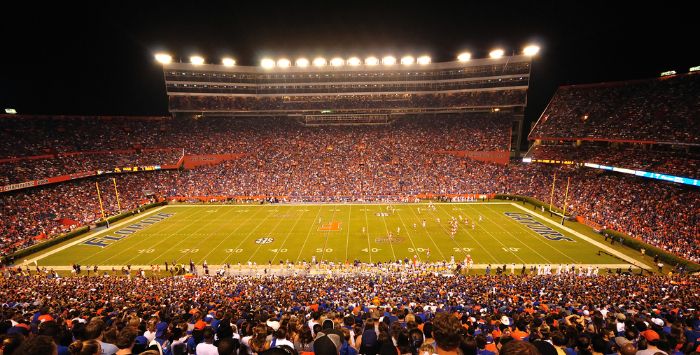“Ben Hill Griffin Stadium’s Major Renovation: Reducing Capacity for a Modernized Fan Experience and Enhanced Facilities”
The iconic Ben Hill Griffin Stadium, affectionately known as “The Swamp,” is set to undergo a transformative renovation that will significantly alter its capacity and modernize its facilities. As one of the most storied venues in college football, the stadium has long been a fortress for the University of Florida Gators, hosting countless memorable games and creating an intimidating atmosphere for visiting teams. However, in response to evolving fan expectations, safety standards, and the need for enhanced amenities, university officials have announced a major overhaul that will reduce seating capacity while elevating the overall game-day experience.
The decision to lower the stadium’s capacity marks a significant shift from the traditional emphasis on maximizing sheer numbers in favor of prioritizing comfort, accessibility, and premium offerings. Currently, Ben Hill Griffin Stadium can hold approximately 88,000 spectators, making it one of the largest college football venues in the country. However, the planned renovations will reduce this number, bringing it closer to a more manageable figure that aligns with modern stadium design trends. While some fans may initially lament the loss of seats, the changes are expected to deliver long-term benefits, including improved sightlines, expanded concourses, upgraded concessions, and state-of-the-art technology integrations.
One of the primary drivers behind the renovation is the growing demand for enhanced fan amenities. In recent years, stadiums across the nation have shifted toward offering more luxury seating options, such as club suites, loge boxes, and premium lounges. These features not only generate additional revenue but also cater to a demographic of fans willing to pay for a more refined experience. By reducing overall capacity, the University of Florida can reallocate space to include these high-end accommodations, ensuring that the stadium remains competitive with other top-tier venues. Additionally, general admission seating will see improvements, with wider seats, better legroom, and improved accessibility for disabled patrons.
Another critical factor influencing the renovation is safety. Older stadiums like Ben Hill Griffin were designed in an era when crowd management and emergency protocols were less sophisticated. Modern codes require more stringent measures, including wider aisles, additional exits, and improved structural reinforcements. The renovation will address these concerns, ensuring that the stadium meets current safety standards while also future-proofing it against potential regulatory changes. This aspect is particularly important given the increasing frequency of extreme weather events in Florida, such as intense heat and severe storms, which necessitate better crowd control and sheltering options.
Technological advancements also play a crucial role in the redesign. Today’s fans expect seamless connectivity, high-definition video boards, and interactive features that enhance their engagement during games. The Swamp’s renovation will include the installation of larger, higher-resolution screens, upgraded sound systems, and widespread Wi-Fi coverage to accommodate the growing reliance on mobile devices for everything from instant replays to concession ordering. These upgrades will not only improve the in-stadium experience but also bolster the venue’s appeal for non-game events, such as concerts and community gatherings.
Beyond the tangible improvements, the renovation reflects a broader shift in how universities approach athletic facilities. No longer are massive, utilitarian stadiums the ultimate goal; instead, the focus is on creating versatile, fan-friendly environments that serve multiple purposes. By reducing capacity, Ben Hill Griffin Stadium can transition into a more intimate yet sophisticated venue that appeals to a wider audience, including families, corporate partners, and casual fans who may have been deterred by overcrowding or outdated amenities in the past.
Of course, the reduction in seating will inevitably spark debate among the Gator faithful. For decades, The Swamp’s massive crowds have been a point of pride, with the stadium’s roaring atmosphere often credited as a key factor in the team’s home-field advantage. However, athletic department officials have emphasized that the changes are necessary to remain competitive in an era where fan expectations are higher than ever. They also point out that a slightly smaller but more engaged crowd can still generate an electric environment, especially if the upgrades lead to higher retention rates and more consistent attendance.
Financing the renovation will be a significant undertaking, with costs expected to run into the hundreds of millions of dollars. The university plans to fund the project through a combination of private donations, athletic department reserves, and potential sponsorship deals. Naming rights for certain sections of the stadium could also be leveraged to offset expenses, though the iconic “Swamp” moniker will remain central to the venue’s identity.
As construction timelines are finalized, the university has assured fans that every effort will be made to minimize disruptions during football seasons, with work likely being phased over multiple off-seasons. Temporary adjustments, such as reduced capacity in certain sections during ongoing construction, may be necessary, but the long-term vision promises a stadium that honors its rich history while embracing the future.
In conclusion, the renovation of Ben Hill Griffin Stadium represents a bold step forward for one of college football’s most hallowed grounds. While the reduction in capacity may be met with mixed reactions, the overarching goal is clear: to create a modern, safer, and more enjoyable venue that meets the demands of today’s fans while preserving the intimidating aura that has made The Swamp legendary. By balancing tradition with innovation, the University of Florida ensures that its iconic stadium will continue to be a cornerstone of Gator athletics for generations to come.



